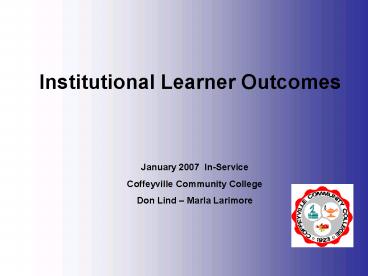Institutional Learner Outcomes - PowerPoint PPT Presentation
1 / 26
Title:
Institutional Learner Outcomes
Description:
... students regardless of the major or professional program. ... 10.Develop a Commitment to Lifelong Learning and Fitness. Reporting Sequencing. Course Outcomes ... – PowerPoint PPT presentation
Number of Views:50
Avg rating:3.0/5.0
Title: Institutional Learner Outcomes
1
Institutional Learner Outcomes
January 2007 In-Service Coffeyville Community
College Don Lind Marla Larimore
2
(No Transcript)
3
Our challenge!!!
4
The Next Step
- Across the nation assessment strategies are being
updated - It is imperative that all colleges determine and
make public not only their mission but also a
list of their CORE ABILITIES. - Programs within the college must do likewise
5
Reporting
- Colleges are now expected to make available, as a
matter of public record, a report indicating how
well Institutional Learner Outcomes (Core
Abilities) are being achieved and - To what extent each program is contributing to
the overall achievement of institutional learner
outcomes.
6
Definition of General Education
A general education fosters the knowledge,
skills, and values essential to all academic
disciplines and encourages the pursuit of
lifelong learning. General education outcomes are
sought in the core academic courses required of
all students regardless of the major or
professional program.
7
Learning Triad
GENERAL EDUCATION (Core Abilities)
TECHNICAL EDUCATION
DEVELOPMENTAL EDUCATION
8
AREAS OF LEARNING
Developmental Ed
9
What Is a Program?
A Program in a college can be whatever that
college wishes it to be
But there must be an agreed upon set of programs
that will undergo periodic program review .
10
(No Transcript)
11
Learner Outcomes
Must Be Established at the Institutional Level
And at the Program Level
And at the Course Level
12
The Three Steps
- Identify institutional core abilities (Gen. Ed.)
required of all degree-seeking students. - There are usually 6-10 core abilities identified
for a college. These are typically stated first
in general terms then delineated for more clarity
for those reading them in the college catalog or
on the college website. These should be
formulated first, then linked with departmental
outcomes designated to nurture the mentioned
knowledge or skill set.
13
The Three Steps
- 2. Identify departmental outcomes for each
department most of which will support one or more
of the stated core abilities. - Depending on the size and diversity of the
department, there may be 6, 10, or possibly 15
departmental outcomes. Departmental outcomes may
be thought off as primary or secondary ones.
The primary outcomes link directly to an
institutional core ability, the secondary
outcomes support or augment the primary ones.
14
The Three Steps
- Identify course level outcomes (already present
in some syllabi) and link them to corresponding
departmental outcomes. - Each course taught will have a number of clearly
stated outcomes. These outcomes (primary) must
be linked to their corresponding departmental
outcomes. The other course outcomes will be
cataloged as secondary outcomes.
15
Review Institutional Learning Goals
- Reflect the values of the college.
- Sometimes known as Core Abilities.
- Are a public statement as to what this college
feels every degree seeking student should be able
to do upon completion of course work.
16
CCCs Plan
DESIGN
IMPLEMENT
EVALUATE
17
Design Phase Part 1Writing Learner Outcomes
Institutional Mission
Gen. Ed. Outcomes (Core Abilities)
Department Learner Outcomes
Department Learner Outcomes
Department Learner Outcomes
Courses Outcomes
18
Design Phase Part 2Codifying Learner Outcomes
Each institutional outcome will be assigned a
code allowing it to be linked or mapped to both
dept. and course outcomes
Each course Outcome will be assigned a number
(code) designating the course, the dept, and
whether it is a Core competency or a
Discretionary competency and which Dept outcome
it supports
Each departmental outcome will be assigned a code
designating the dept, as well as the
institutional outcome it supports
19
Design Phase Part 3
- Design Common Finals for quality assurance
purposes. - Utilize an Outcomes-based Exit Exam.
20
Sample Statement
21
ILOG Institutional Learner Outcome Grid
22
Sample Institutional Learning Outcomes
General Education
- To meet the demands of todays society, students
need to - Communicate Effectively
- Think Critically
- Apply Mathematical Skills in Problem Solving
- Apply the Concepts and Methods of the Natural
Sciences - Develop Insights into Personal and Group Behavior
- Understand Political, Geographic, and Economic
Issues
23
Sample Institutional Learning Outcomes (Continued)
7. Engage in the Creative Process or Interpretive
Performance in the Arts. 8. Understand Creative
Works as Expressions of Individual and Human
Values within Historical and Social Contexts. 9.
Search, Process, and Present Information
Electronically Using Current Digital
Technology. 10.Develop a Commitment to Lifelong
Learning and Fitness
24
Reporting Sequencing
Course Outcomes
Dept./Prog. Outcomes
Institutional Outcomes
25
Performance Reporting
Defining Benchmarks
An Old Benchmark .. 80 80 (s)
Benchmarks typically have 1. of Group 2.
of Attainment
26
The End
Thanks!































